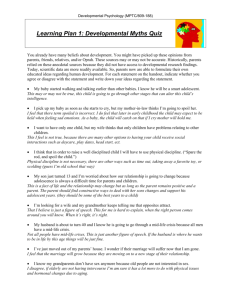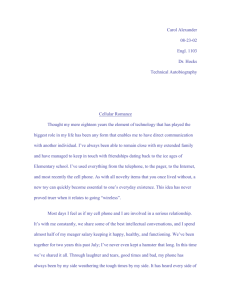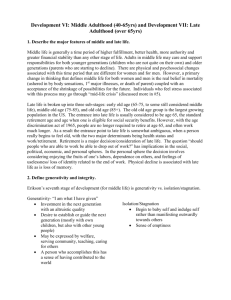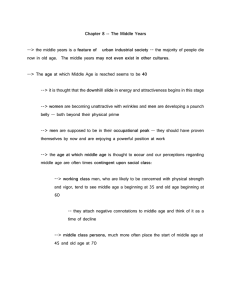Mid-Life Resources
advertisement
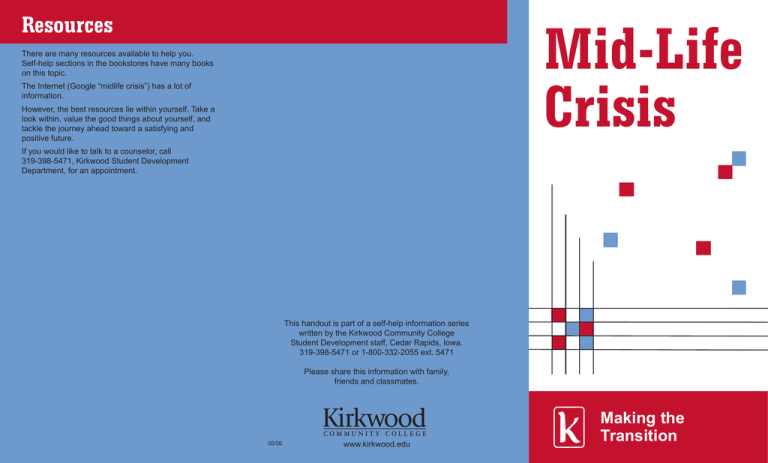
Resources Mid-Life Crisis There are many resources available to help you. Self-help sections in the bookstores have many books on this topic. The Internet (Google “midlife crisis”) has a lot of information. However, the best resources lie within yourself. Take a look within, value the good things about yourself, and tackle the journey ahead toward a satisfying and positive future. If you would like to talk to a counselor, call 319-398-5471, Kirkwood Student Development Department, for an appointment. This handout is part of a self-help information series written by the Kirkwood Community College Student Development staff, Cedar Rapids, Iowa. 319-398-5471 or 1-800-332-2055 ext. 5471 Please share this information with family, friends and classmates. 05/06 www.kirkwood.edu Making the Transition Mid-Life Crisis Mid-Life Growth Looking Ahead If you are between the ages of 30-50, feeling uneasy or downright depressed, wanting to make some changes in yourself or your lifestyle, chances are you are experiencing what has been called in popular terms a mid-life crisis or transition. You may also have wondered if other people have ever experienced what you feel. We never outgrow our need to continue developing and growing as human beings. Jobs, families, hobbies, successes, failures, satisfactions, all are part of the path that brings you to the period of change, a time to look at mid-life growth. Now might be a good time to take stock of where you are and where you want to be. Even if EVERYTHING is going well in your life, you can still benefit from a growth analysis and plan. Start by asking these questions: If you can spend some time developing your thoughts and reflecting on these or similar questions, you will be ready to look ahead and imagine changes for your life. At this point, it may be helpful to spend time discussing some of these issues with a counselor or mentor. Another person can sometimes see possibilities you might miss. Talking about your most important values with someone can be enjoyable as well as helpful. Every person travels the years between 20 and 40 on pathways that lead through good and not-so-good experiences. The stresses and rewards of living move most of us toward periods of reflection – sometimes intense soulsearching. Mid-life (however you might define that) seems to be one of those evaluation times. Evaluation is usually a positive activity. And in many cases, crisis can lead to a positive outcome. 1. What do I value most at work? 2. What is most important to me about social activities and friends? 3. What new skills or knowledge have I acquired this year? 4. What goals should I set for the next five years? 5. Are there new groups or activities I’d like to explore? Crisis Feelings Depression, uneasiness, dissatisfaction, disappointment, fear, stress, curiosity, wanting to hide, feeling unappreciated are all words people have used to describe their mid-life crisis. Your own experience will be unique. There is no single description of the experience that is sufficient, but you can get the general idea. The positive side to this particular crisis is that, in most cases, these feelings are all healthy, normal, natural reactions to a person’s NEED TO GROW. If you are experiencing something like this, and you know there is no underlying medical problem, evaluate the growth possibilities in your life. 6. What interests do I have that give me a chance for new learning? 7. What leisure activities are most rewarding? 8. How do I relate to close family and friends? 9. How do they see my role in life? 10.How can I increase quality time and open communications with these people? 11.What dreams should I start dreaming again? 12.Are there any new hobbies or leisure activities I’d like to start? A next step for many people facing a mid-life transition is to draw up a plan for the future. No one knows for sure what the future might bring in the way of obstacles or benefits, but having a clear idea of what you want out of the next 10 years will increase your chances of getting what you want. Frequently this step includes a lot of collaboration with close family and friends. Try asking someone who knows you well what they think your life will be like in 10 years. Look at possibilities through the eyes of a child. Think about changes that are likely to happen and those you would like to see. Be as imaginative as you can. Thinking about aging and your future need not be discouraging. Usually talking about the future with those closest to you brings insights and opens up possibilities. Keep working until YOU are satisfied with the plan and then begin looking for realistic ways to make your vision of the future actually happen. You will be started on your way to resolving or avoiding a mid-life crisis as you begin a mid-life growth plan. It is possible that your personal evaluation will show you that there are no changes you want to make at this time. No problem. You will have re-affirmed your values and directions by going through the process. More usually, though, such an evaluation will lead you to areas of growth and change.
